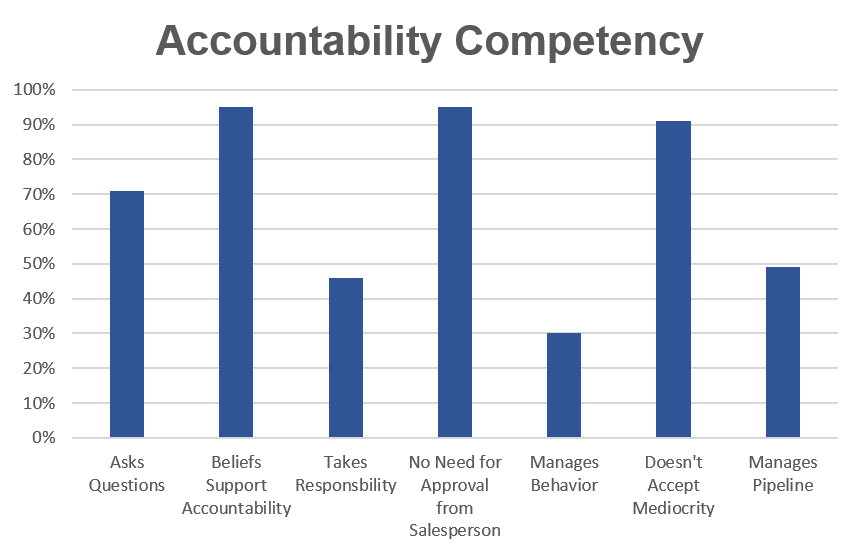
Marshmallow or Meanie Pants?
As a sales leader, there is one overarching thought to keep in mind: It is your responsibility to push your sales reps to greater heights than they would achieve on their own. Otherwise, you are excess cost.
When it comes to doing this, too many times we find sales leaders who are extreme. They either want to be their salespeople’s friend (marshmallow) or feel like they have to be drill sergeants (meanie pants).
I recently conducted a webinar for a group of both new and experienced sales leaders on this topic. Its focus was on sales leadership accountability and as is true with most everything, taught that balance is the key. But I recognize that it can be difficult to achieve that right balance when it comes to managing people. I wrote about the accountability traits of the most proficient sales leaders in this recent article Data Reveals Missing Accountability Traits in Sales Leaders
2 Keys to Avoiding the Extremes
There are two key ways sales leaders can maintain balance and avoid being marshmallows or meanie pants. They can 1) set expectations and 2) become accountability partners. Here’s what I mean:
1) Set Expectations
- Do it for everything. It makes your job easier. If everyone knows explicitly what the expectations are then there won’t be frustration and misunderstandings. And be sure to set expectations about behaviors and activities, not just outcomes. Too often there is a laser focus on outcomes (sales generated) instead of following a plan of activity and behaviors that will produce those outcomes.
- This doesn’t mean you have to bark at your sales reps and dictate every little thing (meanie pants). It is far more impactful if you provide guidance about what they, themselves, indicate they are actually going to do.
- If you have a completely predictable process and you know what the exact metrics are, then you can certainly indicate the required activity to produce the expected result. If you don’t know for sure what those metrics are or should be, then it can be a collaborative thing.
- But don’t fall into the marshmallow mentality. If the level of activity isn’t measurable and precise or seems too low or too high, then it is your obligation to veto it and ask the rep to go back to the drawing board. If you want an easy tool to set this process in place, see our Math of Success form.
2) Become an Accountability Partner
- Rather than being the all-knowing dictator, position yourself as a loving but fair uncle or aunt. You will hold them to their plans and goals. You will inspire them to be better than they would be without you.
- And if you refer back to the first key – setting expectations – tell them that this is your role. Even if they are seasoned professionals, it is still your job to push them to greater heights.
- If you have done a good job of setting expectations with regard to outcomes and to behaviors and activities, then you will have your roadmap for being an accountability partner. Simply hold their feet to the fire on what they have indicated they will do.
- Remember the old adage: What gets inspected gets respected. Keep it simple and focused on the items that will impact outcomes. Below is a simple chart that identifies the key traits of an effective sales leader as it pertains to accountability.

Oversight isn’t Meanie Pants
Seasoned reps want and need oversight. While you may have extreme confidence in them and may default to just letting them do whatever they choose. Recall our mantra that it is your responsibility to push your sales reps to greater heights than they would achieve on their own.
Think about how weird it would be if you weren’t having regular accountability meetings with a high performing rep and something happened, and they stumbled. All of sudden they aren’t producing per usual.
Wouldn’t it be awkward to start meeting and providing oversight where you had not before? Actually, not providing oversight and assuming they’ll snap out of it is being a marshmallow.
Consistency and balance are key and will produce the most predictable results.

By Gretchen Gordon
Gretchen Gordon is the CEO of Boost Profits, a consulting firm specializing in sales team transformation. A self-proclaimed “Sales Nerd” with over 27 years of sales, sales leadership, and sales team transformation experience, she spends most of her time working directly with client companies and helping them improve their sales effectiveness and exceed their sales goals. Gretchen is also a frequent guest speaker for industry events and webcasts, and has been featured on the radio talk shows “Meet the Sales Experts” and "Sales Coaching over Coffee." She is also an accomplished writer, having been featured on industry-leading sites like SellingPower.com and SecurityInfoWatch.com. She authors a “Top 50 Sales Management Blog,” according to Docurated.com, and has published sales-focused eBooks, including “The 5 Essentials of Effective Sales Management” and “Cold Calling in the 21st Century.”
Find out more about Gretchen Gordon on LinkedIn







